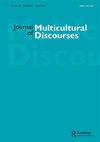Speculations on the political agency of public MatterBio
IF 1.6
Q3 COMMUNICATION
引用次数: 0
Abstract
Beatrice Dube’s article directs those engaged in the study of discourse to an important line of inquiry: while states and governments may evolve political policies may not, and the persistence of these policies, including those that continue practices of inequality, may be rooted in the continuation of certain practices of discourse. In her analysis of the inability of water allocation reform in South Africa to ‘promote equitable access of water for all,’ Dube moves the discussion away from associating the policy’s failure with structural constraints, leading us instead to the persistence of a discourse that promotes what she characterizes as ‘deficit thinking.’ This discourse, espoused through various strata of South African society, defines black individuals as incapable of being ‘active and productive water users as well as competent government officials.’ Dube’s research offers a clear example of the influence of discourse in shaping bodies, beliefs, and practices, but it also leaves us to consider the availability of alternatives and challenges to the prevailing ideology and discourse. In this brief commentary, I want to promote discussion of the possibilities afforded by the recent turn to the material as a means to identify the emergence of public agency and alternative discourses and the potential for such material-discursive becoming to advance social change. With the increasing contemporary presence of a wide range of material objects central to human existence, numerous intellectuals during the past decade have positioned matter as an active force that constitutes not just the material world but also the social world (Latour 2005; Bennett 2010; Barad 2007: Braidotti 2013). Granting matter agency is driven not just by the ubiquity of materiality but also by the suggested limits of the linguistic and representational construction of reality. More than just a product of the symbolic, reality is also constituted through the relations among objects, with the becoming of the world a product of other-than-human actions. The intellectual movement, which for the sake of conciseness I will refer to as new materialism, is not without detractors, with some questioning the merits of the approach based on definitions of agency, a neglect of power, a reliance on metaphysical attunement, and an overly optimistic promise of a more ethical and just world (Malm 2018; Lettow 2017; Rekret 2016; Washick et al. 2015). As with all knowledge work, the challenges to new materialism should not be cause to negate the approach but should rather serve as prompts by which to reconsider and refine the relation between matter and discourse. Dube’s example of water allocation reform in South Africa offers an excellent opportunity to further explore the relation,关于公众MatterBio政治代理的思考
Beatrice Dube的文章将那些从事话语研究的人引向了一条重要的探究路线:虽然国家和政府可能会发展政治政策,但也可能不会,这些政策的持续存在,包括那些继续实行不平等的政策,可能植根于某些话语实践的延续。杜布在分析南非水资源分配改革在“促进人人平等用水”方面的无能时,将讨论从将政策失败与结构性约束联系起来,转向了一种持续存在的话语,这种话语促进了她所描述的“赤字思维”。这种话语得到了南非社会各阶层的支持,它将黑人定义为“既不能成为积极、高效的用水者,也不能成为称职的政府官员”。杜布的研究为话语在塑造身体、信仰和实践方面的影响提供了一个清晰的例子,但它也让我们考虑到主流意识形态和话语的替代方案和挑战的可用性。在这篇简短的评论中,我想促进对最近转向材料作为一种手段所提供的可能性的讨论,以确定公共机构和替代话语的出现,以及这种物质话语成为推动社会变革的潜力。随着对人类生存至关重要的各种各样的物质对象在当代的出现,在过去的十年中,许多知识分子将物质定位为一种积极的力量,它不仅构成了物质世界,而且构成了社会世界(Latour 2005;班尼特2010;Barad 2007; Braidotti 2013)。授予物质代理不仅受到无处不在的物质性的驱动,还受到现实的语言和表征结构的建议限制。现实不仅仅是象征的产物,它也是通过对象之间的关系构成的,世界成为非人类行为的产物。为了简洁起见,我将其称为新唯物主义的知识分子运动并非没有批评者,一些人质疑基于代理定义的方法的优点,忽视权力,依赖形而上学的调和,以及对更道德和更公正的世界的过于乐观的承诺(Malm 2018;Lettow 2017;Rekret 2016;Washick et al. 2015)。与所有的知识工作一样,对新唯物主义的挑战不应该是否定这种方法的原因,而应该是作为重新考虑和完善物质与话语之间关系的提示。杜布的南非水资源分配改革的例子为进一步探索这种关系提供了一个极好的机会,
本文章由计算机程序翻译,如有差异,请以英文原文为准。
求助全文
约1分钟内获得全文
求助全文

 求助内容:
求助内容: 应助结果提醒方式:
应助结果提醒方式:


